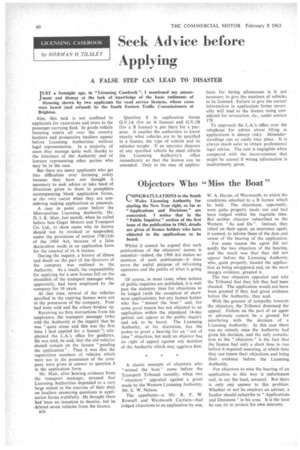Objectors Who "Miss the Boat"
Page 42

If you've noticed an error in this article please click here to report it so we can fix it.
CONGRATULATIONS to the South ‘..-• Wales Licensing Authority for starting the New Year right, so far as "Applications and Decisions" are concerned. I notice that in the "Public Inquiries" section of the first issue of the publication in 1963, details are given of licence holders who have objected to the applications to be beard.
Whilst it cannot be argued that such publications of the objectors' names is essential—indeed, the 1960 Act makes no mention of such publication—it does serve the useful purpose of informing operators and the public of what is going on.
Of course, in most cases, when notices of public inquiries are published, it is well past the statutory time for objections to be lodged (with the exception of shortterm applications); but any licence holder who has "missed the boat" and, for some good reason has not objected to an application within the stipulated 14-day period, can appear at the public inquiry and ask to be heard. The Licensing Authority, at his discretion, has the power to grant a hearing for an "out of time" objection, but such an objector has no right of appeal against any decision of the Authority which may aggrieve him.
A classic example of objectors who "missed the boat" came before the Transport Tribunal recently, when two "objectors" appealed against a grant made by the Western Licensing Authority, Mr. S. W. Nelson.
The appellants—a Mr. R. F. W. Rowsell and Weymouth Carriers—had lodged objections to an application by one, W. A. Hayne, of Weymouth, to widen the conditions attached to a B licence which he held. The objections, apparently, were quite properly made out and had been lodged within the requisite time. But neither objector subscribed to the Western "As and Ds ". Instead, they relied on their agent, an insurance agent, it seemed, to inform them of the date and venue of the hearing of the application.
For some reason the agent did not notify the two objectors of the hearing, and the result was that they did not appear before the Licensing Authority, who, quite properly, treated the application as being unopposed and, on the most meagre evidence, granted it.
The two objectors appealed and told the Tribunal that they felt they had been cheated. The application would not have been granted if they had given evidence before the Authority, they said.
With the greatest of sympathy towards the objectors, the Tribunal dismissed the appeal. Failure on the part of an agent or advocate cannot be a ground for interfering with the decision of a Licensing Authority. In this case there was no remedy once the Authority had given his decision, and the only consolation to the " objectors " is the fact that the licence had only a short time to run before it required renewing, at which time they can renew their objections and bring their evidence before the Licensing Authority.
For objectors to miss the hearing of an application in this way is unfortunate and, to say the least, unusual. But there is only one answer to this problem. Whether or not he employs an adviser, a haulier should subscribe to "Applications and Decisions" in his area. It is the least he can do to protect his own interests.




















































































































